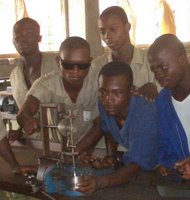 While technological progress in advanced capitalist societies means high-end iPods and feather-weight flat-screens, in western Africa this progress translates into more efficient ways to eat, drink and earn a living. But while many agree that stimulating indigenous entrepreneurship could help lift all Africans out of poverty, the low capital investment to those countries makes building a technology base difficult outside of foreign aid.
While technological progress in advanced capitalist societies means high-end iPods and feather-weight flat-screens, in western Africa this progress translates into more efficient ways to eat, drink and earn a living. But while many agree that stimulating indigenous entrepreneurship could help lift all Africans out of poverty, the low capital investment to those countries makes building a technology base difficult outside of foreign aid.
The MIT Fab Lab offers a new avenue to growth by encouraging low-cost technological innovation. In Ghana, the Fab Lab is currently producing a time-saving design for processing the staple cassava. The goal of team brainstorming is to create a machine small enough for a kitchen, independent of electricity, and that can simultaneously pound and turn the cassava meal. But, aside from eventually solving their design challenge, an ever more valuable part of the Fab Lab is the goal which inspired the project:
processing the staple cassava. The goal of team brainstorming is to create a machine small enough for a kitchen, independent of electricity, and that can simultaneously pound and turn the cassava meal. But, aside from eventually solving their design challenge, an ever more valuable part of the Fab Lab is the goal which inspired the project: to teach machine design principles and in general design methodology for any project, using a well understood problem. For Fablabs to be self-sustainable there needs to be local leaders who can identify problems, make an action plan and act upon it. Introducing students and teachers with the design methodology which is applicable in general to all projects was an important goal that was achieved during the implementation of the project.
Other projects in Ghana alone include: a high gain TV antenna, a solar energy collector, and low-cost, portable refigeration for medicines.
27.11.05
Indigent Innovations
Posted by melanie at 6:15 PM
Subscribe to:
Post Comments (Atom)




0 Comments:
Post a Comment